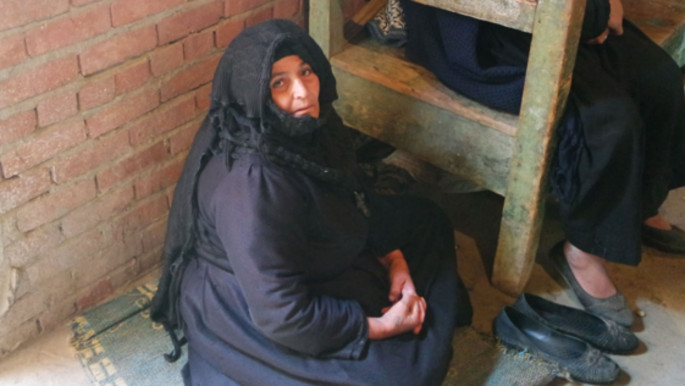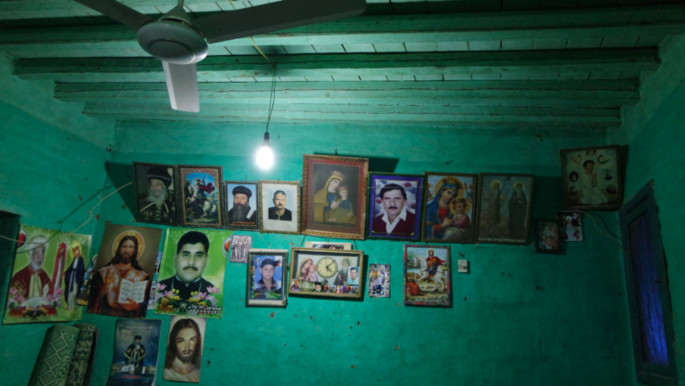Families of Copts murdered in Libya recount their torment
But on the night of 12 January, the cause of his insomnia was more personal. He had just found out that his brother, Maged Suleiman Shehata, had been captured by the Islamic State group (IS) in Libya.
He called me as I was on my way to Alexandria at about 9.30pm. I asked him if he had heard about the seven Copts captured by IS. He hadn't heard anything. The last time he had spoken to his brother was a week before news of his capture emerged.
Shehata, 45, had been at St Mary's church in Al Oor village, about 220 kilometres south of Cairo, receiving those paying their respects. Still they came, a week after the gruesome video was released, showing the beheading of 21 Christian Egyptians.
Thirteen of the victims had come from this impoverished village, strewn with rubbish on muddy alleys where the prospects of making a living in chaos-ridden Libya was more attractive than staying.
Upper Egypt, where Al Oor is located, has the highest poverty rate in the country, with 51.5 percent living below the poverty line.
 |
|
|
Miriam Shehata's family grieve, but give thanks that their son's torment is over [Farid Farid] |
The chronic poverty drove Maged and his relatives to work in the construction industry in Sirte in Libya, lured by the prospect of scratching out a living.
"He had three children, how could he have provided for them? Working here for less than 30 pounds ($4). People are living here somehow - if you have some cattle, you feed them, and then you just work the land, but that's it," said Shehata.
In her meagre shack emblazoned with a blue cross outside, Miriam Melek Shehata recalled sitting alongside her relatives and daughter.
Her husband, Maged, had travelled to Libya with the other men from the Shehata family in May 2014 and she had not seen him since.
"If we had stayed like this, we would have lost our minds but we thank God that it has finally ended" she said. She remembers talking to him on 31 December, pleading with him to come home and leave the rampant climate of insecurity in Libya.
The next time she heard of him was when IS had claimed responsibility for his capture.
| We have been living through this grief for months - until the joy that filled our hearts with their martyrdom. - Miriam Shehata |
"We were shocked. From the fast leading up to Christmas until today, we have not even celebrated with a proper meal in our mouths," she said.
"We have been living through this grief for months - until the joy that filled our hearts with their martyrdom. But the pain of losing him has been very hard.
"When you are about to slaughter a chicken, you are afraid, so if [IS] are not afraid of killing [the Christian Egyptians] why did they cover their faces? What are they afraid of?"
Therese Atia Shehata, 55, speaks proudly of her youngest of four sons, 24-year-old Youssef.
 |
|
|
In the cramped Shehata family home, portraits of their murdered sons vie for space with religious icons [Farid Farid] |
He was planning to come home a few days before his capture.
She maintained that some "negotiators" affiliated with IS had been in contact with her male relatives claiming they knew where her son was.
"Right up until the day when the news came that they had been murdered, there was one anonymous caller who said he would take 70,000 Egyptian pounds ($9,200) to bring them back," she tols al-Araby. "Not one hair on their heads had been harmed, he said, and he said he knew their whereabouts.
"We told them when you bring them to us safely we will give you the money - but they just wanted to take opportunity of the situation and make money from us. Give us our sons back, and we give you the money.
"We were very hopeful right up until the last moment that they would come back - but we thank God always."
The families spoken to by al-Araby said that the Egyptian authorities had been helpful and understanding - but were not willing to discuss further details about the apparent negotiators who made contact with them outside the purview of the authorities.
| We never knew where our sons were or what happened to them. We now know they are in heaven. - Bushra Suleiman |
Back at the church, Bushra Ibrahim Suleiman, 52, whose 22-year-old son, Kirollos, was killed with his cousins spoke of his frustration.
"We are emotionally tired of talking about this. Talking hasn't brought them back. We never knew where our sons were or what happened to them. We now know they are in heaven," he said.
"We are still hurt, our insides are broken and we don't want to keep on talking about it because the pain is renewed.
"Every time I remember that scene it hurts me. I saw that video from start to finish and I was not relieved until I watched it because at least I knew where my son will end up after this life."





 Follow the Middle East's top stories in English at The New Arab on Google News
Follow the Middle East's top stories in English at The New Arab on Google News


